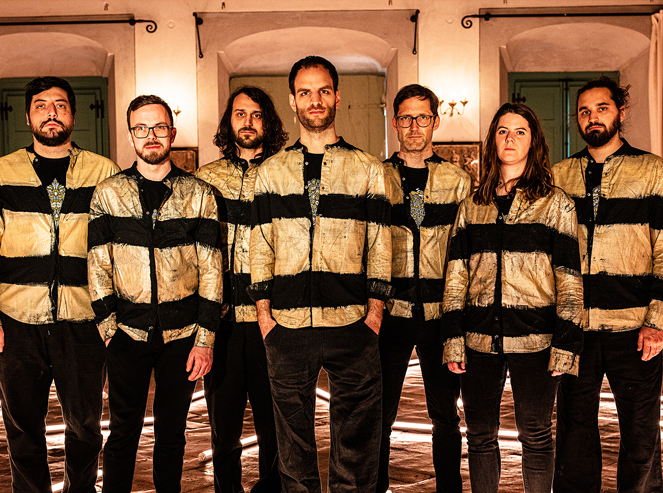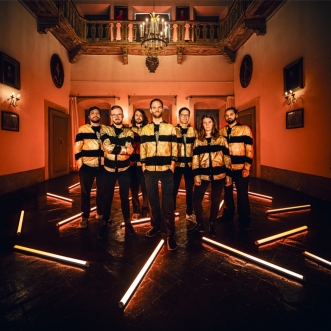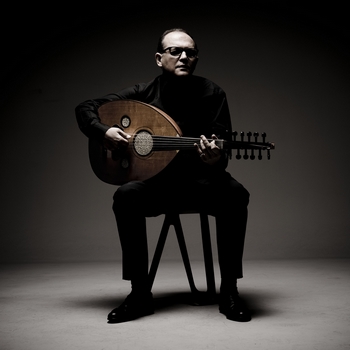jazz
Shake Stew

Présentation du spectacle
Le septet phénomène
Afrobeat hypnotique, débauche d’énergie et grooves jazz pour un “something else” rafraîchissant.
France Musique
Nouvel album 29 avril 2022 : Heat
Shake Stew, étoiles montantes autrichiennes récompensées en 2021 par le prix allemand du jazz dans la catégorie "groupe de l'année international", présentent avec leur cinquième album Heat :
Un délicieux mélange conçu à partir d'afrobeats hypnotiques et d'éruptions sonores extatiques, absolument addictif !
Album live 2020
Ecoute ICI
Album Gris Gris , novembre 2019
Ecoute ICI
Tournée en septet
Lukas Kranzelbinder ; contrebasse, guembri
Astrid Wiesinger : Sax alto, stritch
Johannes Schleiermacher : Sax ténor, flute
Mario Rom : trompette
Oliver Potratz : contrebasse
Niki Dolp : percussions
Mathias Koch : percussions
Sur la route depuis 2016, Shake Stew revient avec Heat, cinquième album euphorique avec une nouvelle saxophoniste alto, l’autrichienne Astrid Wiesinger qui a insufflé une nouvelle énergie au groupe qui s’entend tout au long de ce nouvel album.
Ces dernières années, peu de groupes ont autant bouleversé la scène jazz d'Europe centrale que Shake Stew. Alors que le ZEIT les a qualifiés de "groupe de jazz autrichien indispensable " et que la NDR les a élevés très tôt au statut de "groupe culte", il est clair, au moins depuis l'attribution du Prix allemand du jazz 2021 dans la catégorie "groupe de l'année international", que quelque chose s'est mis en route, qui n'avait encore jamais existé sous cette forme. Et il ne fait aucun effort pour ralentir !
Dès le début, la formation créée par le bassiste et compositeur Lukas Kranzelbinder est entourée de quelque chose de mystique qui, en concert, déclenche un effet extraordinairement envoûtant auquel peu de gens peuvent se soustraire : "Les mots magiques non prononcés s'appellent magie et énergie - Shake Stew apporte quelque chose de culte au jazz actuel, un enrichissement ! " écrit le jury de la critique allemande du disque dans sa justification pour l'inclusion dans la liste des meilleurs morceaux de 2020 et le magazine britannique MOJO devient même un peu plus physique : "Able to blind you into a trance and make you dance to your knees, Shake Stew twists, blisters and burns like a fevered dream !"
Malgré sa formation inhabituelle avec deux batteries, deux basses et trois cuivres, le groupe parvient toujours à attraper ses auditeurs de tous âges d'une manière incroyablement directe, que ce soit devant un public debout dans un club plein à craquer ou dans la grande salle comble du Konzerthaus de Vienne. "Il n'est pas nécessaire d'aimer le jazz pour aimer Shake Stew : Le groupe de Lukas Kranzelbinder est réglé de la tête aux pieds pour l'extase. Ou librement selon Nietzsche : "Ce n'est pas de la musique, c'est de la dynamite !" (Wiener Zeitung)
Des afrobeats hypnotiques et des rythmes entraînants ont marqué le son du groupe dès le début, mais c'est justement au moment où l'on croit avoir déchiffré la formule magique de ce ragoût musical que Shake Stew révèle toute l'étendue sonore de son orchestration unique : A la limite du silence absolu, des créations sonores surgissent comme si elles étaient sorties de nulle part, perlant sur des lignes de basse répétées comme en transe et des patterns de gong finement accordés. Leur calme et leur fragilité vous touchent au moins aussi profondément que les explosions de groove qui les ont précédées.
"Il émane de ce groupe quelque chose de nouveau et de particulier – et d'extraordinairement attrayant", écrivait le ZEIT dans son analyse, et quel que soit le côté de Shake Stew qui vous emporte finalement le plus violemment : Votre corps continuera à vibrer longtemps après la dernière note !
L'histoire de sa création reflète également une caractéristique décisive qui accompagne le groupe depuis ses débuts : depuis la première note jouée ensemble, la musique du septuor se fraie un chemin et produit sans cesse de nouvelles facettes - quelles que soient les circonstances défavorables. Lorsque les sept compositions de Heat ont commencé à prendre forme vers la fin de l'année 2020, il est vite devenu évident que cette musique devait être enregistrée et diffusée le plus rapidement possible. Mais comme chacun sait, la société allait alors de confinement en confinement et les répétitions entre les musiciens en partie autrichiens et en partie allemands ne pouvaient être réalisées que dans des conditions difficiles. C'est pourquoi il a été décidé qu'un projet d'envergure était nécessaire pour sortir le groupe du quotidien de la pandémie et l'amener dans un environnement où il pourrait pleinement allumer la flamme née de la nouvelle formation et l'enregistrer sur disque. Le studio Cicaleto à Arezzo, en Toscane italienne, a été choisi comme tel et, au prix d'un gros effort logistique (trajets jusqu'à 18 heures avec différents trains pour réduire au maximum l'empreinte écologique), Shake Stew a réussi à travailler et à faire de la musique ensemble pendant cinq jours dans cette enclave. Dès le premier soir, tout le monde a pris conscience de la valeur de cette rencontre en ces temps d'isolement interpersonnel, et l'énergie intense et la joie de jouer de ces sessions de studio se laissent deviner sur Heat au bout de quelques instants seulement.
Le titre de l'album a été choisi après longue réflexion comme le terme qui décrit le mieux l'état qui se produit lorsque deux objets/corps créent une sorte de "magie" par leur interaction et créent ensemble quelque chose qui n'existe qu'à ce moment précis. Il décrit d'une part le sentiment qui surgit au moment où la musique devient de plus en plus intense pendant que l'on joue et où l'on perçoit en soi-même la "chaleur" montante qui se crée entre les différentes personnes/objets - et qui, dans le cas idéal, nous submerge.
D'autre part, il décrit également tout type de musique/magie qui se produit lorsque deux (ou plusieurs) individus créent un lien entre eux, qui va dans la même direction en totale harmonie et qui s'en trouve énormément renforcé. Les sept compositions de l'album restent fidèles au son de base du groupe (3 cuivres, 2 basses, 2 batteries), mais reflètent en même temps une douceur et une émotion nouvelles, qui n'étaient pas encore audibles sous cette forme.






















